+
El Otro Lado Zine
by Sascha Altman DuBrul Author
Sascha Scatter provides us with an account of his trainhopping trip to Mexico and what he encounters there. This isn't just another tale of glamorizing train hopping as much as it's an account of Sascha learning about how things are different on "el otro lado" (the other side). Mexican citizens intending to cross the border refer to the US as "el otro lado" instead of simply as the US. He meets people, has some adventures, and learns about important cultural differences.
You must log in to comment.
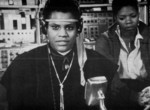

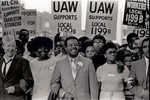
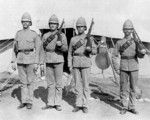

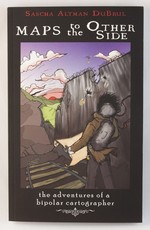
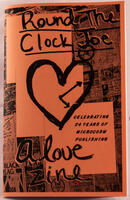


Comments & Reviews
this is the intro at the beginning of the zine which I think Barney Rubble up there missed...
El Otro Lado
this is the intro to a zine i wrote in 1999
Juan Carlos grandfather had fought in the Mexican Revolution and as our boxcar swayed back and forth, the rumbling sound of the train grinding along track like the ocean or the rain coming down hard, Juan Carlos told me stories his grandfather had told him of Emiliano Zapatas soldiers riding from town to town on the same freight lines, gathering troops, spreading the word and supplies. He spoke of the peasant uprisings fought against the Federales with the battlecry of land and liberty, the reappropriation of land from the wealthy haciendas, by the poor armies, the traditional indigenous ejedo system of communal land ownership which had been around since the beginning of time, and the visionaries like Ricardo Flores Magón* who dreamed of a future free from the tyranny of corrupt leaders and brutal authority.
Nearly a century later, in post-NAFTA Mexico,** the two of us rode on a north bound freight train filled with desperate men fleeing the poverty of their home towns, risking their lives to make the long journey to the border of the United States. As the creaky old train carried us through small pueblos with thached roof houses and corn fields, we stared out into the hot sun and made a pact of eternal friendship, swearing that wed spend the rest of our lives fighting for justice and breaking down the walls put up by our governments and the societies that had raised us.
Juan Carlos was from the state of Aguascalientes, a fiery young Anarchist punk who was on his way north to find work in a hotel and send some money back home to his seven brothers and sisters. I was a gringo from New York City, traveling alone and slowly making my way back home after working as a human rights observer in the Lacondon Jungle in Chiapas with the Zapatistas. Wed met at the Anarchist library in Mexico City and traded good stories and the tee-shirts off our each others backs. After half a year of traveling and working volunteer jobs down in rural areas, I was suddenly back in the city, the fast paced slang-filled chilango Spanish much more akin to my native urban tongue full of swears and cuss words. There was a whole crew of punks from Guadalajara Juan Carlos had hooked up with and they were leaving that night to head back home after a weekend of playing a big show with their band. We traveled together up north on passenger trains as Juan Carlos and his friend rode freight, and we all met up in a punk house on the outskirts of Guadalajara a couple days later.
Just like most of my Anarchist friends back home, Id ridden a few freight trains in the United States. I knew how to dodge a bull and read a train map and use a crew-change guide. I knew how to get on and off a moving hopper car or 48, hoist myself onto an open boxcar, hide between strings of track and tell which trains to ride by the number of units and what cargo they carried. Id heard a few stories about the freight trains in Mexico and how dangerous they were, how they were full of bandits and thieves ready to knife you for a dollar and leave you dying in the desert sun. When Juan Carlos offered to take me on the freight lines in Mexico, I had no idea what I was getting myself into and how the short trip would change the course of my life forever.
It was a magical ride. After a loud and beautiful farewell party from the crew of punks, the two of us caught a train of empty boxcars out of the yard in Guadalajara and rode it up the coast to Mázatlan. By the time we had past through all the yards, the train was full of people. It took us two nights and a day. The car we rode was full of corn scraps and as the train speeded along the track, Juan Carlos and I threw handfuls of the grain off the sides into the earth around us, laughing and singing to each other about sewing the seeds of the revolution. It was the middle of Spring, and when our train sided amidst acres of mango orchards, hundereds of us would jump off the train and fill our pockets with handfuls of the huge red and green fruits. At night we watched shooting stars from the door of the boxcar and during the day we watched the huge jagged mountains fly by in the distance.
Unlike the trains back home where the sight of another tramp was rare if ever, the freights in Mexico were literally covered in riders. Our boxcar was filled with people, all men, all full of stories of hardship and suffering. Some had made the journey before, for some it was their first time. All of them carried few or no possessions and all of them had dreams of life on the other side of the border. They called themselves las trampas and when they spoke of the United States, they always called it El Otro Lado, literally, The Other Side. The men on the boxcar next to us were from Tegulcigapa, Honduras and each of them had money saved to pay to the men who were known as coyotes to guide them across the border. There was a Salvadorian family two cars down, a thick-mustashed man, wife, and two little children who would smile at me when I passed. Everyone was really friendly to me, the only gringo on the train. They asked lots of questions about the Zapatistas and my travels, and treated me like a brother.
After a day and a half on the train, I started to have this really intense realization: riding freight trains south of the US border was just like the accounts Id read of what it was like to ride the rails in the United States during the Great Depression. It was straight out of a John Steinbeck novel except it was Mexico in the 1990s. After a day and a half on the train, listening to peoples stories around me, having time to reflect on the months Id just spent in Guatemala and Chiapas as the mountains and towns blew by from the door of the boxcar, I started thinking about the inevitability of revolution. I started to think about how so many of the people who have been fucked over by the United States and their own nationals in league with American business are, left without recourse, slowly but surely making the journey across the border, soley for survival. I started to realize that the men I was traveling with were refugees fleeing the wasteland that had been created by the economic equivalent of a scorched earth policy all throughout Mexico and Central America. Everyone waiting at the militarized border was desperately trying to get a tiny piece of the riches being horded in the United States. It was like a fucking timebomb. What was going to happen to all these people who didnt make it across the border? If they couldnt be confined to urban slums, theyd surely end up in prison or dead. I shivered in the warm tropical air.
I crossed the border myself in Tijuana a few weeks later, scruffy and broke, all my Zapatista literature and photos confiscated back in Mázatlan by the Federales, but all I had to do was flash my passport and I didnt get a second look by the immigration police. When I returned to the Bay Area of California, me and a couple folks gathered together a crew of friends and rode freight trains to Active Resistance, the Anarchist gathering in Chicago. During those Summer travels, waiting in the hobo jungles and on the edge of yards and in the towns along the train line, I began to notice more and more that most of the people I came across on the freight trains were from Mexico and Central America. I began to recognize the Spanish grafitti under train bridges and on the trains, calling out home towns and Central American countries with scrawled magic markers and grease sticks.
I became a man obsessed. Back in New York, after a friend taught me how to use the Internet, I began to look up articles and press releases from the US rail companies. I found a number of news articles on labor websites about modern day Mexican train robbers, poor peasants who would put rocks on the tracks and rob the trains for corn and sugar as they passed through their towns. And it wasnt just one isolated incident I read about. It was happening all over Mexico, from Durango to Veracruz to Gómez Palacio. At the same time, along with almost everything else in Mexico in the post-NAFTA economy, the entirty of the Mexican railways was in the process of being privatized and sold to US corporations. I started to see a pattern. As rail lines in Mexico became privatived and consolidated into US conglomerates and the country became evermore impoverished, the people lost respect for the system. The railroads in Mexico had always been an icon of nationalism since the time of the revolution. It was what interconnected all the different rural areas, it was the way low income people got around. The freight lines were really thought of as forth-class travel, a necessary social service for the incredibly poor and destitute. The global economy was in the process of robbing them of their only means of transportation.
After living in Oakland for the Winter, I spent the entire next Spring and Summer riding trains up and down the West Coast, working in the day-labor spots with immigrants and sleeping in missions and hobo camps, writing stories about the men I met and the life and struggle out on the road. I had this great plan to write exciting travel stories that could educate people about the global economy and give voice to a section of the population that hardly ever get heard. My eventual plan was to cross back over to the other side of the border and ride freight all the way to down to Tapachula, the industrial city in Chiapas on the border of Guatemala where the train line ends and the journey for so many begins. That was my big plan, but I never made it.
So what happened? you may ask. Its a complicated answer. I ended up in jail in Texas for stealing food. I ended up in love in California. I ended up on living on a farm on a tiny island in British Columbia with my girlfriend, determined to learn how to grow my own food so I wouldnt be reliant on the agribusiness death machine for the rest of my life. I grew weary of carrying all my stuff in a backpack and dreaming of having a room of my own somewhere. But really it was more than all that.
One of my big internal struggles as I traveled and wrote the bulk of the material youre about to read was that I didnt know why I was doing it. Who was it being written for? Why was I writing it? After writing little zines for my friends and always dreaming of being a real writer like my father, this was going to be my first big story that would lanch me on my career as an aspiring young journalist. But my days along the Texas-Mexican border convinced me that the world was too fucked up to just need another gabacho travel writer trying to pass through Mexican peoples lives and pitch self-indulgent stories to US Leftist weeklys. I was sick of being an outsider and sick of being so lonely. Reluctantly I put the entire writing project in a closet at my moms house for almost two years and just recently discovered its seductive pages beckoning me back for some kind of closure. So here it is.
I was on the farm in British Columbia one night checking my email, when I recieved a long message sent by my good friend Erez writing from Guatemala. After riding trains all across Canada and down the West Coast, he had just finished riding the freight line all the way from the border of California to the end of the line in Chiapas, Mexico and sent me all his journal entries. I sat there in awe, the crickets chirping in the background with the humming of the computer, wiping the tears from my eyes with my farm hardened hands. I was so moved by his words from afar, and I had the realization that night that sometimes we need our friends to live out our dreams for us because we cant live them all for ourselves. So Erezs journal entries are the conclusion to this long and jangled story. And I hope you can live out some of your dreams through us in the following pages. They were written for you.
This is a pretty interesting zine, but the description should be clearer. The bulk of the material is not by Sasha Scatter, but by a friend of his. I've only read a little over half of this zine, but so far I've found it to be one of the best I've ever read.
This is the first 'Zine I ever read and it's set the standard for me. Sascha is an amazing soul. He helped set up an online community for us crazy bipolar types, called the Icarus Project (http://www.theicarusproject.net), which was a godsend to me and others).